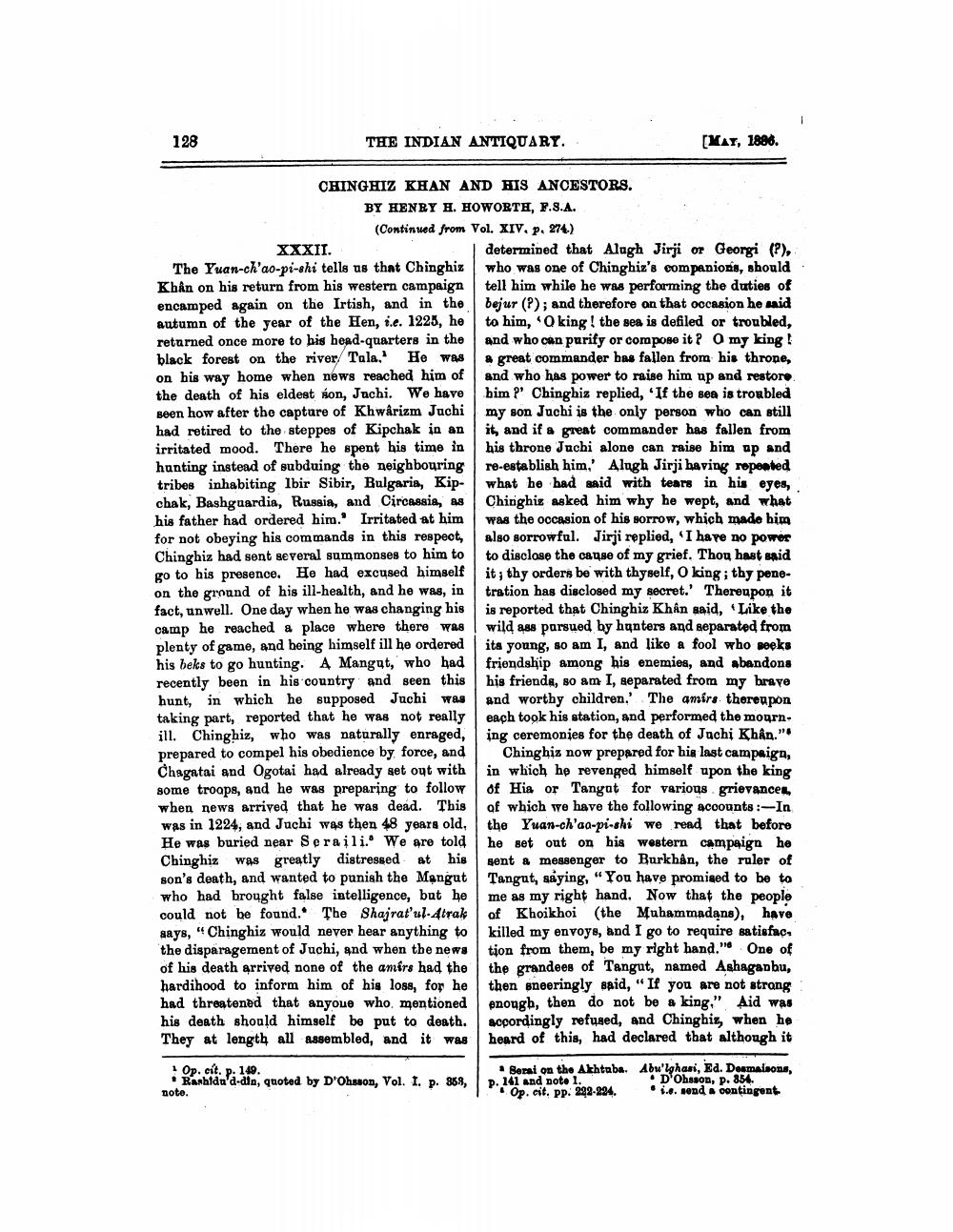________________
128
THE INDIAN ANTIQUARY.
CHINGHIZ KHAN AND HIS ANCESTORS. BY HENRY H. HOWORTH, F.S.A. (Continued from Vol. XIV. p. 274.)
XXXII.
The Yuan-ch'ao-pi-shi tells us that Chinghiz Khan on his return from his western campaign encamped again on the Irtish, and in the autumn of the year of the Hen, i.e. 1225, he returned once more to his head-quarters in the black forest on the river Tala,' He was on his way home when news reached him of the death of his eldest son, Juchi. We have seen how after the capture of Khwârizm Juchi had retired to the steppes of Kipchak in an irritated mood. There he spent his time in hunting instead of subduing the neighbouring tribes inhabiting Ibir Sibir, Bulgaria, Kipchak, Bashguardia, Russia, and Circassia, as his father had ordered him. Irritated at him for not obeying his commands in this respect, Chinghiz had sent several summonses to him to go to his presence. He had excused himself on the ground of his ill-health, and he was, in fact, unwell. One day when he was changing his camp he reached a place where there was plenty of game, and being himself ill he ordered his beks to go hunting. A Mangut, who had recently been in his country and seen this hunt, in which he supposed Juchi was taking part, reported that he was not really ill. Chinghiz, who was naturally enraged, prepared to compel his obedience by force, and Chagatai and Ogotai had already set out with some troops, and he was preparing to follow when news arrived that he was dead. This was in 1224, and Juchi was then 48 years old, He was buried near Seraili." We are told Chinghiz was greatly distressed at his son's death, and wanted to punish the Mangut who had brought false intelligence, but he could not be found. The Shajrat'ul-4trak says, "Chinghiz would never hear anything to the disparagement of Juchi, and when the news of his death arrived none of the amirs had the hardihood to inform him of his loss, for he had threatened that anyone who mentioned his death should himself be put to death. They at length all assembled, and it was
note.
Op. cit. p. 149.
Rashidu d-din, quoted by D'Ohsson, Vol. I. p. 359,
[MAY, 1886.
determined that Alagh Jirji or Georgi (?), who was one of Chinghiz's companions, should tell him while he was performing the duties of bejur (?); and therefore on that occasion he said to him, 'O king! the sea is defiled or troubled, and who can purify or compose it? O my king! a great commander has fallen from his throne, and who has power to raise him up and restore him ?' Chinghiz replied, 'If the sea is troubled my son Juchi is the only person who can still it, and if a great commander has fallen from his throne Juchi alone can raise him up and re-establish him.' Alugh Jirji having repeated what he had said with tears in his eyes, Chinghiz asked him why he wept, and what was the occasion of his sorrow, which made him also sorrowful. Jirji replied, 'I have no power to disclose the cause of my grief. Thou hast said it; thy orders be with thyself, O king; thy penetration has disclosed my secret.' Thereupon it is reported that Chinghiz Khân said, 'Like the wild ass pursued by hunters and separated from its young, so am I, and like a fool who seeks friendship among his enemies, and abandons his friends, so am I, separated from my brave and worthy children.' The amirs thereupon each took his station, and performed the mourning ceremonies for the death of Juchi Khân."
Chinghiz now prepared for his last campaign, in which he revenged himself upon the king of Hia or Tangat for various grievances, of which we have the following accounts:-In the Yuan-ch'ao-pi-shi we read that before he set out on his western campaign he sent a messenger to Burkhân, the ruler of Tangut, saying, "You have promised to be to me as my right hand. Now that the people of Khoikhoi (the Muhammadans), have killed my envoys, and I go to require satisfac. tion from them, be my right hand." One of the grandees of Tangut, named Ashaganhu, then sneeringly said, "If you are not strong enough, then do not be a king," Aid was accordingly refused, and Chinghiz, when he heard of this, had declared that although it
Serai on the Akhtaba. p. 141 and note 1.
Op. cit. pp. 222-224.
Abu'lghasi, Ed. Desmaisons, D'Ohsson, p. 354. i.e. send a contingent.




